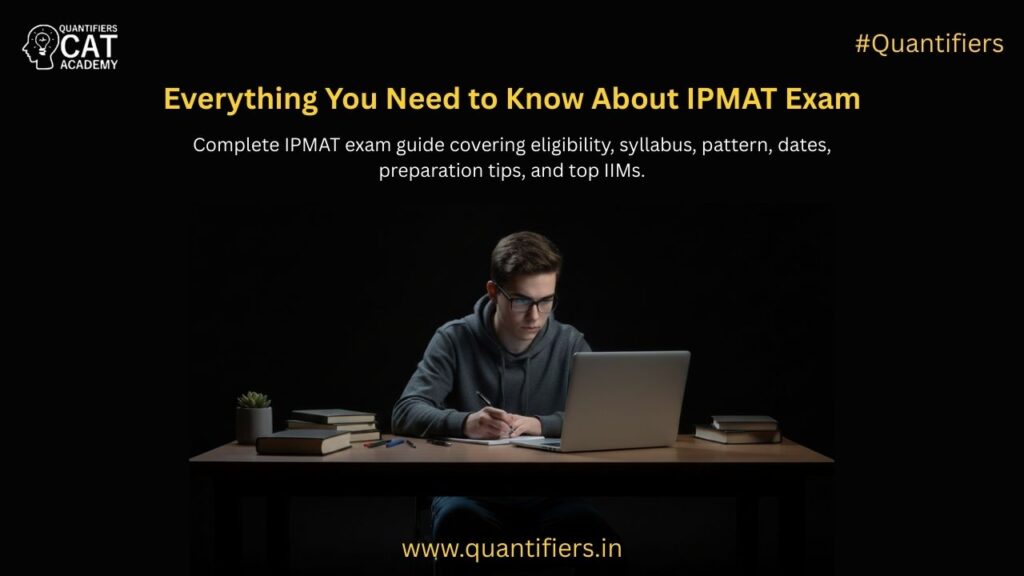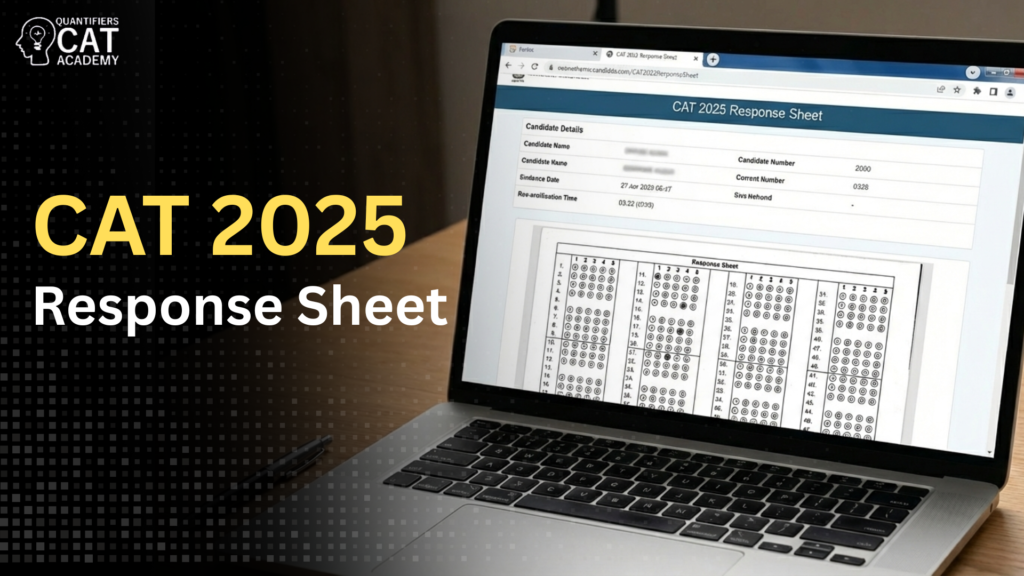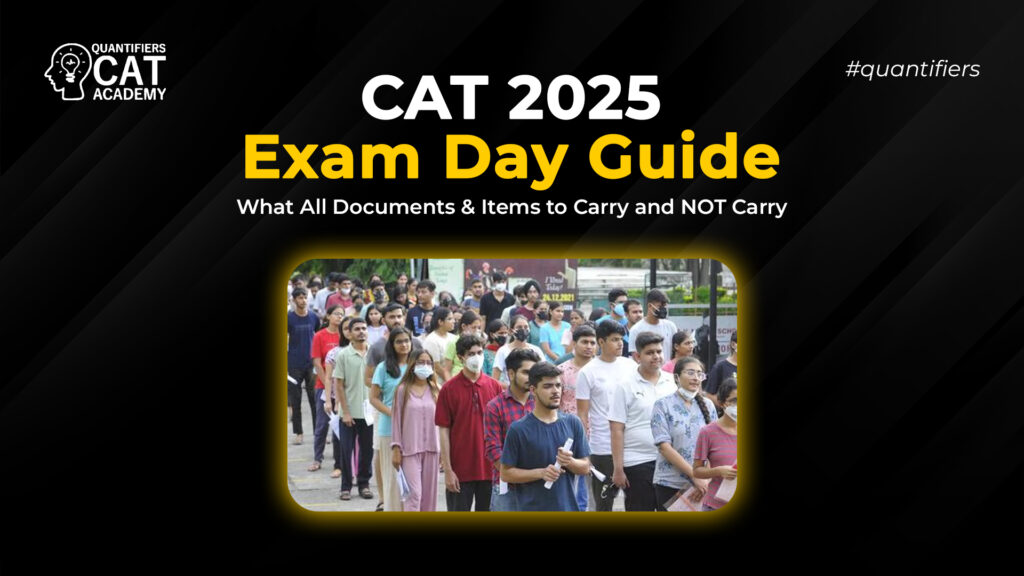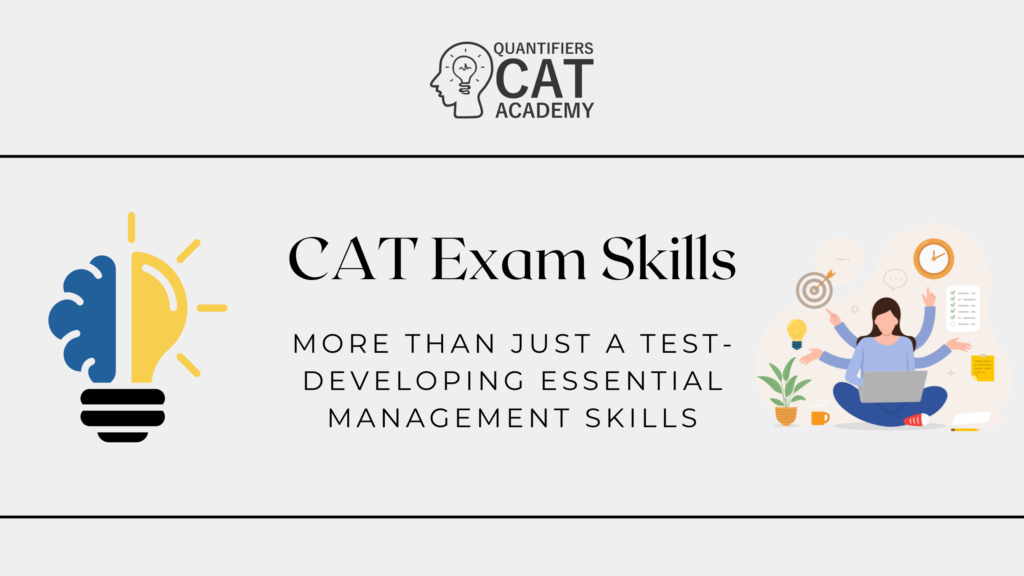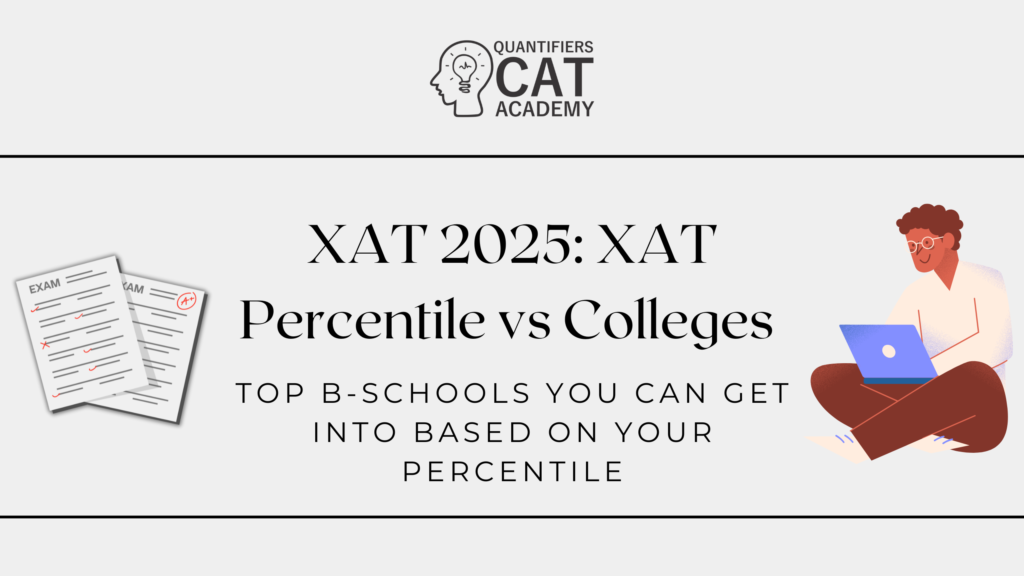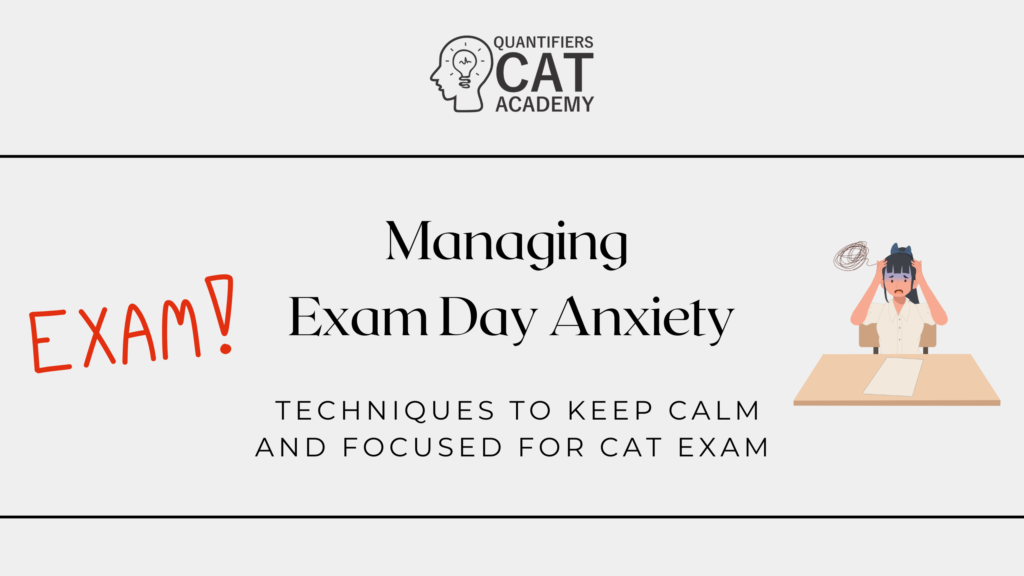CAT Preparation Basics: Why Weak Fundamentals Are Killing Your CAT Scores
CAT preparation basics decide your CAT performance more than mocks...
CAT Exam With Job: Can You Crack CAT 2026 While Working Full-Time?
CAT exam with Job is not about long study hours—it’s...
CAT 2025 Preparation Strategy for Working Professionals
CAT 2026 Preparation Strategy for Working Professionals is about managing...
CAT Preparation Strategy for Non-Working Aspirants
CAT Preparation Strategy for Non-Working Aspirants is not about studying...
10 Must-Do Things to Crack GDPI (No Fake Motivation, Just Real Prep)
GDPI preparation is the deciding factor in MBA admissions. Learn...
Right Time to Start MBA 2026 Prep
Right Time to Start MBA 2026 Prep is 12–15 months...
GDPI Engineering Preparation for Engineers
GDPI Engineering is where engineers stop hiding behind technical answers...
ROI of MBA in India: Best Colleges, Cost vs Salary (Let’s Talk Money, Not Vibes)
ROI of MBA in India depends on fees, placements, specialization,...
GDPI Humanities: How Humanities Students Can Crack MBA GDPI Rounds
GDPI Humanities is where Humanities students gain a real edge....
Build a Strong MBA Profile
MBA profile building is no longer optional. Learn how to...
Written Ability Test (WAT) Tips
Written Ability Test (WAT) is a crucial MBA admission round...
MBA Specialisations – A Complete Guide to Choosing the Right Path
MBA specialisations shape your career, job roles, and growth. Learn...
CAT Exam Roadmap 2026 | A Step-by-Step Preparation Plan (So You Don’t Spiral Midway)
CAT Exam Roadmap 2026 explains a step-by-step, stage-wise preparation strategy...
GDPI Preparation for Commerce Students | MBA Interview Guide
GDPI Preparation for Commerce Students is where MBA interviews are...
GDPI Topics for MBA: 100 Important Topics for CAT 2025–26
GDPI topics for MBA mapped across social issues, business, abstract...
GDPI Preparation 2025 – Complete Strategy to Convert MBA Calls
GDPI Preparation 2025 requires a focused strategy covering self-analysis, GD...
CAT Vocabulary Preparation: Smart VARC Strategy for 99+ Percentile
CAT vocabulary preparation focuses on contextual word usage, not memorisation....
CAT Preparation for Engineers: Smart Strategy to Score 99+ Percentile
CAT preparation for engineers demands more than Quant strength. This...
CAT Preparation for Non Engineers: Crack IIMs Smartly
CAT Preparation for Non-Engineers requires a focused strategy that builds...
Top 10 IIM Colleges in India
Top IIM colleges in India ranked by NIRF 2025 with...
CAT 2026 Exam: Dates, Syllabus, Pattern & Preparation Strategy
CAT 2026 Exam complete guide covering expected dates, syllabus, exam...
Everything You Need to Know About IPMAT Exam
IPMAT is a national-level entrance exam for Class 12 students...
Everything You Need to Know About CMAT Exam 2026
CMAT Exam 2026 is a national-level MBA entrance test conducted...
XAT Admit Card 2026 Download – Date, Steps & Exam Day Instructions
XAT Admit Card 2026 is now available for download. Check...
CAT 2025 Results: Expected Date, How to Download & What to Do Next
CAT 2025 results are expected in late December. Check expected...
XAT Time Management Tips 2026
XAT time management tips that help aspirants handle Decision Making,...
XAT Decision Making & GK Guide with PYQs for 2026 Prep
XAT Decision Making preparation made simple—understand DM logic, ethical rules,...
XAT vs CAT: Key Differences Every MBA Aspirant Must Know
XAT vs CAT is a key decision for MBA aspirants....
XAT Exam Pattern & Prep Strategy (2026 Guide)
XAT Exam Pattern 2026 explained in detail with section-wise structure,...
SNAP 2025 Exam Guide: Pattern, Syllabus, Colleges, Cutoffs
SNAP 2025 is a 60-minute MBA entrance exam by Symbiosis...
XAT 2026: Exam Date, Registration, Preparation Strategy & XAT Online Coaching | Quantifiers CAT Academy
XAT 2026 complete guide covering exam date, registration, syllabus, cutoff,...
GDPI Course for CAT 2025
The Quantifiers GDPI Course 2025 is a complete online preparation...
CAT 2025 Response Sheet
Learn how to download CAT 2025 response sheet, calculate your...
MBA Application Deadlines & B-School Forms 2025 Guide
MBA Application deadlines for 2025 span exams, forms, and interviews....
What After CAT 2025? Complete MBA GDPI & WAT Guide
What after CAT? This blog explains CAT 2025 results, GDPI,...
Everything You Need to Know About NMAT 2025
NMAT 2025 is a flexible MBA entrance exam by GMAC...
Best CAT Coaching in Chandigarh – Quantifiers CAT Academy
Best CAT Coaching in Chandigarh – Quantifiers CAT Academy Choosing...
XAT 2026: Everything You Need to Know
XAT 2026: Everything You Need to Know Introduction to XAT...
CAT 2025 Exam Day Guide: What All Documents & Items to Carry and NOT Carry
CAT 2025 Exam Day Guide: What All Documents & Items...
Top MBA Colleges to Apply Before CAT 2025
Top MBA colleges close applications before CAT 2025. Learn which...
FMS Delhi Form 2026 Out: Last Date to Apply – 26th November | Complete Guide for CAT 2025 Aspirants
FMS Delhi Form 2026 Out: Last Date to Apply –...
CAT 2025 Quantitative Aptitude: The Ultimate 40-Day Plan to Master High-Weightage Topics
Learn the most important CAT 2025 Quantitative Aptitude topics &...
CAT 2025 Admit Card – Release Date, Download Guide, and Exam Day Checklist
CAT 2025 Admit Card will be released on November 5,...
Avoid these 5 Mistakes in the Last 45 Days of CAT 2025
Avoid the 5 biggest mistakes in the last 45 days...
How to Overcome Stress During CAT Preparation – 50-Day Battle Plan by Quantifiers CAT Academy
Feeling anxious or left behind while preparing for CAT 2025?...
MBA From IITs
Explore MBA opportunities at IITs with details on eligibility, fees,...
CAT 2025 Prep Resources | Free & Paid Tools by Quantifiers
Preparing for CAT 2025? Don’t waste time searching scattered PDFs...
CAT 2025 Form Last Date, IIM Kozhikode Pattern & 90-Day Prep Plan | Quantifiers
Procrastinating your CAT 2025 registration? The clock is ticking—last date...
How Many CAT Mocks to Give Before the exam? | Ultimate Mock Test Strategy for CAT 2025
Struggling with CAT prep? Wondering how many mocks you really...
Beat Procrastination: Daily Micro-Habits for CAT aspirants for CAT 2025
With only 100 days left for CAT 2025, build small...
CAT vs Other MBA Entrance Exams: Which One Should You Focus On?
Explore the top MBA Entrance Exams for 2025 – CAT,...
IIMs Requiring Separate Forms for MBA Admissions 2026
Some IIMs like Mumbai, Rohtak, Amritsar, and Visakhapatnam need separate...
SNAP 2025 Notification Out – Check Dates, Eligibility, Fees, Pattern
SNAP 2025 registration is now open! Know all about exam...
CAT 2025 Registration Guide – Step-by-Step Process, Fees & Deadlines
The CAT 2025 registration window has officially opened on August...
NMAT 2025 Notification, Dates, Registration, Syllabus & Strategy Guide
Get all NMAT 2025 details — registration dates, fees, attempts,...
How I Went from 40 to 95 Percentile in CAT VARC (Verbal Ability & Reading Comprehension)
Struggling to improve your CAT VARC score? This real journey...
CAT 2025 IIM Kozhikode Releases Notification: Exam on Nov 30, Registration Starts Aug 1
CAT 2025 official notification is out! Exam on Nov 30....
What is a Good CAT Percentile for IIM ABC, FMS & Other Top B-Schools?
Wondering what CAT percentile you need for IIM Ahmedabad, Bangalore,...
CAT 2025 Preparation Plan for Working Professionals | 5 Month Startegy
Working full-time and preparing for CAT 2025? Follow this 5-month...
Why CAT Mocks Are a Must for CAT Prep | Start Now to Get Ahead
CAT mocks aren't the final step—they're the core of your...
Hate Novels but Want a 99%ile in VARC? Read This!
Think you need to love novels to ace CAT VARC?...
Strategic Plan to Crack CAT 2025 – A Guide for Repeaters
Retaking CAT 2025? This strategic plan helps repeaters identify past...
CAT 99 Percentile Strategy for 2025: Section-Wise Scores You Need
Aiming for the 99 percentile in CAT 2025? This blog...
CAT Mock Analysis – Analyse Mocks Like a CAT Topper
Learn effective CAT Mock Analysis to avoid repeating mistakes, optimize...
CAT 2026: Exam Overview
Get a complete overview of CAT 2026—exam dates, eligibility, registration...
How to Master VARC for CAT 2025: No-Nonsense Tips
VARC for CAT 2025 isn’t about grammar—it’s about comprehension and...
Top 10 Mistakes CAT 2025 Aspirants Must Avoid
CAT 2025 prep is full of hidden traps. This blog...
MDI Gurgaon MBA Results 2025
MDI Gurgaon MBA Results 2025 are live for PGDM, HRM,...
IIT Delhi MBA Results 2025 Out
IIT Delhi MBA Results 2025 are now live. Learn how...
CAP 2025 Results Out
CAP 2025 results have begun rolling out, with IIM Udaipur...
Top 10 MBA Colleges in Delhi (NCR) – 2025 Edition
Delhi NCR is a hub for top MBA colleges offering...
Scholarships at IIMs: Making India’s Top MBA Dreams Affordable
An MBA at IIMs can be expensive, but scholarships make...
7-Month CAT Preparation Plan: May to November
Plan your CAT 2025 prep smartly with this structured 7-month...
IIM Calcutta Final Results 2025 Declared
IIM Calcutta has released its final MBA 2025 results. This...
XLRI 2025 Results Are Out! Track Waitlist Movement & Check your Results!
The XLRI 2025 results are here! This blog helps you...
IIM Ahmedabad PGP 2025-27: Final Results Date & Key Shortlisting Insights
The final results for IIM Ahmedabad's PGP 2025–27 batch are...
Highest Paying MBA Specialization
Wondering which MBA path pays the most? This blog uncovers...
Best MBA Colleges in India with Low Fees and High ROI
Looking for an MBA that’s affordable yet rewarding? This blog...
Top HR Colleges in India
Discover India’s leading HR colleges, including XLRI, TISS, and IIMs....
CAP Round Result 2025: Everything You Need to Know
CAP Round Result 2025 will decide MBA admissions for IIMs....
CAT 2025 Syllabus and Exam Pattern: All you need to know
CAT 2025 Syllabus covers VARC, DILR, and QA. Understand the...
Does age matter in IIMs?
Does age matter in IIMs? IIMs welcome candidates of all...
MBA from IITs: A Complete Guide
Discover everything about MBA from IITs—eligibility, admission process, fees, placements,...
Admission Weightage Components for IIMs
Understand the admission weightage components for IIMs, including CAT score,...
CAT 2025 Notification
Get all the essential details on CAT 2025, including notification,...
Most Important Quant Topics for CAT 2025
Master the most important quant topics for CAT 2025, including...
Best MBA Colleges – Official NIRF Ranking
Discover the top-ranked management institutions in India with the official...
CAT 2025 Preparation for Working Professionals
Struggling to prepare for CAT 2025 while working? This 8-month...
CAT for Working Professionals with Experience
Working professional applying for MBA? Learn how to highlight your...
CAT Exam Skills: More Than Just a Test-Developing Essential
CAT Exam Skills are more than just for the test....
Is CAT Right for Me? A Self-Assessment Guide for MBA Aspirants
Considering an MBA? This self-assessment guide helps you decide if...
CAT Exam: Your Gateway to Top MBA Programs in India
Learn how the CAT exam for top MBA colleges can...
Career Opportunities After CAT: Exploring Diverse MBA Career Paths
Wondering about Career Opportunities After CAT? Explore top MBA career...
How to prepare for CAT 2025 – Strategies for Working Professionals
Juggling work and CAT prep? This guide provides expert strategies,...
Unlock Your Dream B-School: 5 Reasons Why You Should Choose the CAT Exam
Wondering why choose CAT exam? This blog explores 5 key...
Decoding the GDPI WAT Preparation: Everything You Need to Know
Preparing for the GDPI WAT? This guide provides expert tips...
Nail Your CAT Interview Preparation: From Nervous Wreck to Confident Candidate
Preparing for your CAT interview? This guide covers key areas,...
Current Affairs for GDPI: Topics you can’t Afford to Miss
Preparing for GDPI? This guide provides a comprehensive list of...
CAT Coaching: Online vs. Offline – Find Your Perfect Fit with Quantifiers for CAT 2025
Choosing between online vs offline CAT coaching for CAT 2025?...
Group Discussion Decoded: How to Stand Out (Without Being a Know-it-All)
Ace the GDPI Group Discussion! Learn tips on participation, teamwork...
Beyond the CAT Score: B-School Selection Criteria and what they really want
What do B-schools look for? This blog reveals selection criteria...
GDPI Hot Seat: Answering the Trickiest Questions
Facing the GDPI hot seat? We reveal common questions &...
Decoding the GDPI Puzzle: Your Winning Strategy
Conquer the GDPI hurdle! Our expert strategy breaks down the...
SNAP 2024 Colleges vs Percentile: A Comprehensive Guide
Explore the best MBA colleges under SNAP 2024, categorized by...
Top MBA Colleges in 80-90 percentile
Scored a CAT percentile of 80-90? Unlock opportunities at top...
XAT 2025: XAT Percentile vs Colleges
Wondering where your XAT 2025 percentile can take you? This...
Understanding the refund policy of MBA colleges
Understand the refund policy for MBA courses to safeguard your...
Crushing CAT 2025: Your Roadmap to B-School Success
Begin your journey to B-school success with a detailed month-by-month...
MBA Colleges Accepting 60-70 Percentile in CAT
Scoring 60-70 percentile in CAT opens doors to reputable MBA...
Best MBA Colleges Accepting 70 to 80 Percentile in CAT
Scoring 70-80 percentile in CAT opens doors to reputable MBA...
How to Answer “Why MBA?” in CAT GDPI: A Comprehensive Strategic Guide
Answering "Why MBA?" in CAT GDPI requires showcasing your career...
GDPI CAT 2024: A Dealmaker or Dealbreaker
GDPI CAT 2024 is your chance to shine beyond scores....
Mastering Your CAT GD-PI Self-Introduction: The Ultimate Guide to Standing Out
Master your CAT GD-PI Self-Introduction with confidence! Start strong with...
The Final Countdown: Your Last Day Before the CAT Exam
The last day before the CAT exam can feel overwhelming,...
Building Confidence in Quantitative Ability: Overcoming the Math Hurdle for CAT Success
Feeling unprepared for the Quantitative Ability section of the CAT...
Managing Exam Day Anxiety: Techniques to Keep Calm and Focused for CAT
Overcome exam day anxiety with relaxation techniques and prep tips....
Difficulty in Managing Negative Feedback: Turning Setbacks into Stepping Stones for CAT Success
Learn how to handle negative feedback effectively and use it...
Overwhelming Syllabus of CAT Exam: How to Tackle It Effectively
Feeling overwhelmed by the syllabus of CAT exam? Get a...
Making the Most of Diwali for CAT Exam Prep: Strategies for Staying Productive During Festive Times
Diwali can still be productive with our tips! Discover the...
Reading Resources for CAT + 10 Ways to Improve Reading Speed and Comprehension
Elevate your CAT prep with our essential reading list. Get...
Study Smart, Not Hard: Effective CAT MBA Prep Tricks
Tired of studying hard with no results? Get the CAT...
Top 10 Best MBA Colleges in Mumbai: Costs & Careers
Your guide to MBA programs in Mumbai, the heart of...
Top 10 best MBA colleges in Delhi NCR: Fees and placements
Choosing MBA colleges in Delhi NCR? Discover top programs, compare...
Debunking CAT Exam Myths | Clear Facts Revealed
Think the CAT is only for math geniuses? Discover the...
Balancing CAT Prep with Full-Time Work
Balance CAT prep with your full-time job. Expert advice on...
Is doing MBA in India worth the hype? MBA Job Prospects: Placement & Market Outlook
Is doing MBA in India worth the hype? MBA Job...
MBA or Business Startup? How MBA Aids Entrepreneurs
MBA or Business Startup? How MBA Aids Entrepreneurs Quantifiers 3rd...
Top Finance MBA Colleges in India 2024: Insights, fees and placements and ranking
2024’s Best MBA Marketing Colleges in India: Rankings & Fees...
2024’s Best MBA Marketing Colleges in India: Rankings & Fees
2024’s Best MBA Marketing Colleges in India: Rankings & Fees...
List of MBA in HR Colleges in India Based on 2024 Ranking with Fees & Placements
List of MBA in HR Colleges in India Based on...
Is an MBA Worth Investing 20-30 Lakhs? Why MBA costs so high: Find out!
Is an MBA Worth Investing 20-30 Lakhs?Why MBA costs so...
Mastering the CAT Syllabus: A strategic guide to score 99%ile
Mastering the CAT Syllabus: A strategic guide to score 99%ile...
Best Time to Start Preparing for CAT 2024
Best Time to Start Preparing for CAT 2024 Quantifiers 27th...
Ace CAT 2024 Without Coaching: Top Free Resources
Ace CAT 2024 Without Coaching: Top Free Resources Quantifiers 26th...
Weak at Maths/Quant? Start your Quant CAT prep from scratch; Resources and Tests.
Weak at Maths/Quant? Start your Quant CAT prep from scratch;...
How can I keep myself motivated without getting distracted throughout CAT preparation?
How can I keep myself motivated without getting distracted throughout...
Best MBA Colleges for Each Specialization in India
Best MBA Colleges for Each Specialization in India Quantifiers 24th...
Optimize Your GAP Year for CAT Prep Success
Optimize Your GAP Year for CAT Prep Success Quantifiers 24th...
Top B-Schools in India: Ranking, Specializations, and Admission Criteria
Top B-Schools in India: Ranking, Specializations, and Admission Criteria Quantifiers...
Cracking CAT: Daily Schedule & Consistency Guide
Cracking CAT: Daily Schedule & Consistency Guide Quantifiers 22nd March...
Is CAT Coaching Worth It? Find the Best CAT Coaching for you.
Is CAT Coaching Worth It? Find the Best CAT Coaching...
Past years CAT Exam Analysis: Latest Trends & Question Types
Past years CAT Exam Analysis: Latest Trends & Question Types...
IIM Admission Percentile Requirements – How much percentile do I need to get into IIMs
IIM Admission Percentile Requirements – How much percentile do I...
Best CAT Prep YouTube Channels: Are They Enough?
Best CAT Prep YouTube Channels: Are They Enough? Quantifiers 21st...
Getting Into IIMs as an Average Student: Tips & Insights
Getting Into IIMs as an Average Student: Tips & Insights...
How to Analyse CAT Mocks? Strategy for CAT 2024 Aspirants, The Exact key points you need
How to Analyse CAT Mocks?Strategy for CAT 2024 Aspirants, The...
Can a non-engineer crack CAT? CAT Preparation for Non-Engineering Background Students
Can a non-engineer crack CAT? CAT Preparation for Non-Engineering Background...
Avoid These Common Mistakes and Beat Procrastination in CAT Preparation
Avoid These Common Mistakes and Beat Procrastination in CAT Preparation...
Full CAT 2024 Syllabus Analysis, Important Topics, and Accessible Resources for Free CAT Practice
Full CAT 2024 Syllabus Analysis, Important Topics, and Accessible Resources...

































